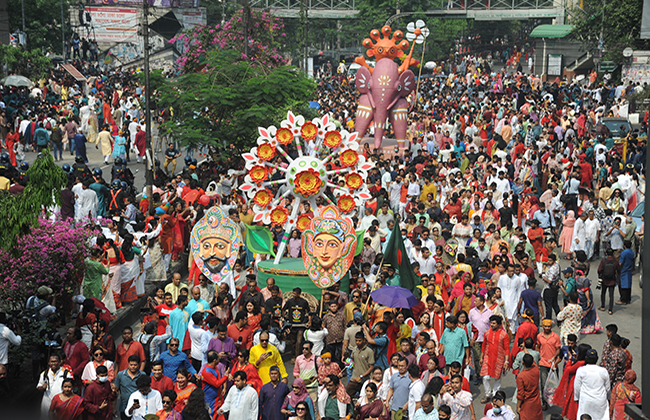
On Sunday, Bangladesh joyously welcomed Pahela Baishakh, the first day of the Bangla calendar, marked by vibrant traditional festivities and widespread enthusiasm.
The celebrations commenced at dawn as artistes from Chhayanaut serenaded the arrival of the new year under Ramna Park’s banyan tree with Rabindranath Tagore’s iconic song “Esho hey Baishakh, esho, esho”.
Across the nation, people from diverse backgrounds gathered at various historic and popular locations to celebrate the onset of the Bangla year 1431, filled with renewed hopes for peace and prosperity.
In Dhaka, the day’s highlight was the Mangal Shobhajatra procession, which began at 9:18 am from the Faculty of Fine Arts at Dhaka University. This procession, emblematic of unity and cultural pride, featured participants in vivid costumes and with symbolic artifacts, parading past landmarks like Shahbagh, Dhaka Club, and Shishu Park.
The Faculty of Fine Arts played a pivotal role, showcasing the artistic and creative expressions that underpin Bangladesh’s rich cultural heritage. The event reinforced the institution’s dedication to cultural preservation and promotion.
Originating over six centuries ago during the reign of Mughal Emperor Akbar—who introduced the Bangla calendar in 1556 to simplify land tax collection in ‘Subah Bangla’—Pahela Baishakh is now an essential part of Bangladeshi culture and the country’s largest cultural festival.
As part of the celebrations, traders and shopkeepers inaugurate their ‘Halkhata’ (new account books) and offer sweets to guests, adhering to time-honoured traditions. Revelers, particularly youths, don traditional attire and converge on the streets at dawn to partake in the festivities.
Culinary traditions are also on full display as many enjoy ‘panta-bhat’ (watery rice) with fried Hilsa, lentils, green chili, and onions, a testament to the rich culinary heritage of the region.
Stringent security measures ensured the day’s peaceful progression, with restrictions on vuvuzelas to prevent any disturbances. Police provided escorts for the Mangal Shobhajatra and monitored the event from strategic vantage points, guaranteeing a safe environment for all attendees.
Pahela Baishakh remains a day of joy and cultural pride, reflecting the unity and resilience of the Bangladeshi people as they look forward to a year of prosperity and harmony.
